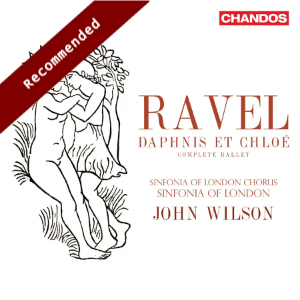
Maurice Ravel ((1875-1937)
Daphnis et Chloé M. 57 (1909-12)
Sinfonia of London and Chorus/John Wilson
rec. 2022, Church of St Augustine, Kilburn, London
Chandos CHSA5327 SACD [54]
Daphnis and Chloe is, I think, Ravel’s finest work and it has had several good recordings over the years. I think particularly of Munch, Monteux, Dutoit and, most recently, Roth, who brought the tang of period instruments of the French kind to his recording. Now John Wilson, who has already made some fine recordings of French music, has entered the field. It turns out that, during the lockdowns of the pandemic, he embarked on a revision of the score, as the standard 1913 one by Durand, which was reprinted by Dover – and which is the one he and I both have – is full of mistakes. He explains, both in a short article in the booklet with this recording and in a longer one in the November 2023 issue of Gramophone magazine, that lists of errata have been circulating for years and that he set to work using these and also drawing on a copy of the composer’s manuscript, the Durand parts, which had been marked with Ravel’s revisions but not carried through to the score, and other material. He had thought of waiting for the critical edition by Jean-François Monnard for Breitkopf, but was told it would take another five years. (In fact the Breitkopf score came out in May 2022, and so Wilson could have consulted it before making this recording.) He reckons he found over 10,000 errors in the Durand score.
Some of the errors which he has corrected were glaring, such as missing or wrong percussion parts, incorrect notation of the celesta and E flat clarinet and many, many small points. Wilson also tested his revised score, having Sakari Oramo and Ryan Wigglesworth both conduct it before he himself took it to the studio. He finally did so last December with his Sinfonia of London, a pick-up orchestra if you like, but one with many distinguished players and which he revived and uses regularly.
The result is a wonderfully refined and atmospheric performance. There is a great deal of quiet writing in this lavish score, and this is apparent from the beginning, which is barely audible. The quality of the woodwind playing is immediately apparent. Adam Walker, the principal flute, rightly gets a credit as he has so much solo work, but all the wind and brass phrase and articulate beautifully, and passages where they play together in thirds or octaves are absolutely unanimous and dead in tune. The strings, frequently divided into multiple parts, play with grace and elegance. The brass show phenomenal agility.
The is one of the works which uses a wordless chorus, which I think must have been specially recruited for the purpose. Their great challenge comes at the beginning of the second part, just before the pirates come in. Here they have a long unaccompanied passage, which absolutely must not drop in pitch as at first distant fanfares and then the whole orchestra join in. They acquit themselves superbly here.
In fact, all the big scenes are well done. I am not going to list them all but I particularly enjoyed the pirates’ dance, dawn and the final general dance. Wilson takes the fast passages faster than I am used to, but the brass keep up with some amazing articulation. He also shows sensitive phrasing in the more lyrical passages; I had feared he might be slightly stiff, but it is not so.
The booklet, in English and French, includes an interesting essay on the origins of the work by Roger Nichols as well as Wilson’s short essay, and also the libretto giving the action in detail. The recording is excellent.
This recording has been greeted with plaudits on many sides and brickbats from at least one. I am with the first group. You might also want to have Roth’s version, among recent recordings, for the period instruments, but alongside, not instead of this. Warmly recommended.
Stephen Barber
Previous reviews: Paul Corfield Godfrey (December 2023) ~ David McDade (December 2023)
Help us financially by purchasing from




















